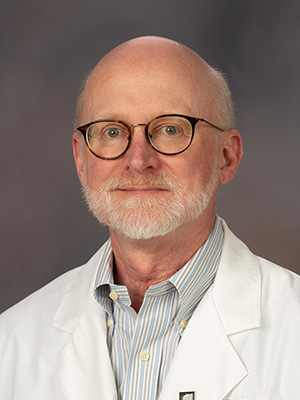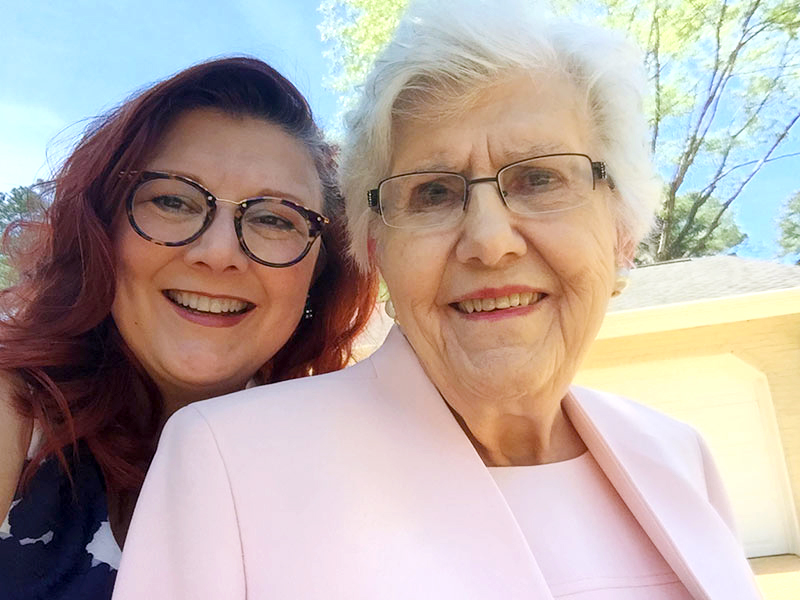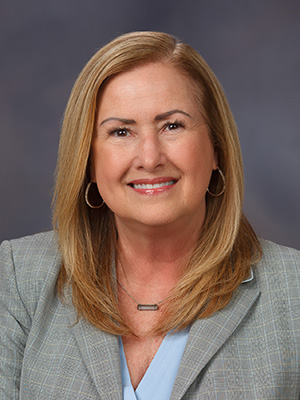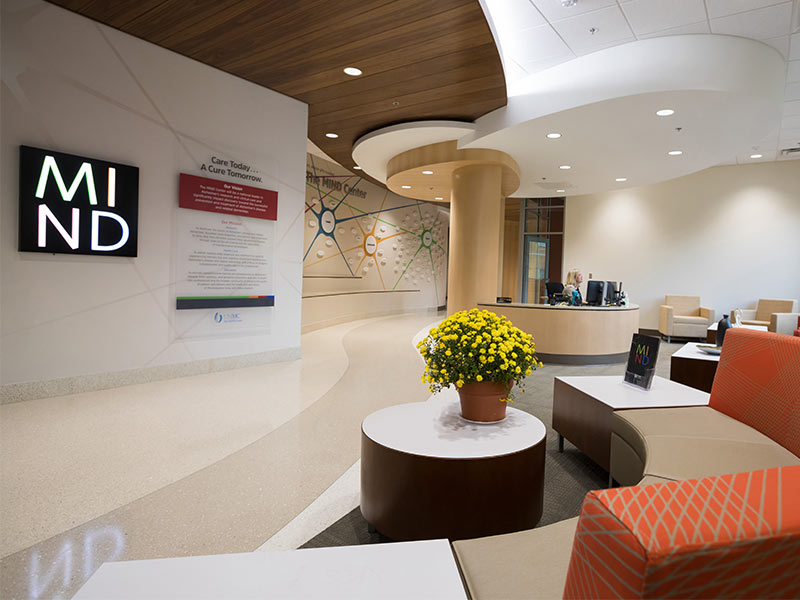MIND Center to detail Alzheimer’s research; salute patients, caregivers
Why does one person grow old without developing diseases that affect memory and cognitive skills? And why does someone else’s brain decline as he or she ages to the point that he or she can’t perform daily tasks, such as dressing himself or herself?
Experts at the University of Mississippi Medical Center’s The MIND Center are combining research, brain imaging and genetic technologies to make discoveries about Alzheimer's disease and dementia. How that potentially affects the lives of both patients and their caregivers will be in the spotlight June 21 during an educational program at UMMC, “Mind Matters: New Research into the Causes of Alzheimer’s and Dementia.”
The free, public presentation is sponsored by The MIND (Memory Impairment and Neurodegenerative Dementia) Center and will raise awareness about the Alzheimer’s Association’s annual observance called “The Longest Day.”

“We’ll get people up to speed on where we are in our research and recent changes in how we think about diagnosis and treatment for Alzheimer’s disease and dementia,” said Dr. Thomas Mosley, the Dudley and Robbie Hughes Distinguished MIND Center chair and the center’s founding director.
The presentation in the Nelson Student Union on UMMC’s main Jackson campus begins with registration and refreshments at 5:30 p.m., followed by a talk by Mosley from 6-7 p.m. The Alzheimer’s Association encourages the public to take part in “The Longest Day” to observe not just the summer solstice that makes that date the year’s longest day, but to pay tribute to thousands of people who will join together nationally to show their love for those affected by Alzheimer’s and dementia.
“Early diagnosis allows people to take a proactive part in their treatment plan, and to use their voice to decide what they want, when they want it and how they want it,” said Adina Welker, a program director for the Alzheimer’s Association Mississippi Chapter.
Those attending the June 21 program will include Alice Skelton of Jackson. She cares for her mom, 84-year-old Elsie Skelton, who was diagnosed with dementia in 2010 and Alzheimer’s in 2015.
“We’ve been connected to The MIND Center from the very beginning,” Skelton said of her mother’s caregivers, Dr. Kathy Gregg, associate professor of geriatric medicine, and Sue Ann Meng, The MIND Center’s social worker.

Making the evening more special is combining “The Longest Day” with The MIND Center’s ongoing “Mind Matters” series, which Skelton and her mother attended in April. Every other month, “Mind Matters” focuses on a different facet of Alzheimer’s or its research, giving good information to the public on progress being made in combating the disease and on coping skills for caregivers and patients alike.

“June is Alzheimer’s and Brain Awareness Month, and we’re going to honor and recognize those who are living with, or caring for, an individual with Alzheimer’s disease,” said Denise Lafferty, The MIND Center’s chief of operations. “The Longest Day is all about love.”
The MIND Center Clinic on the UMMC campus offers diagnostic and outpatient treatment for patients with memory loss and cognitive impairment, including dementia and Alzheimer's disease. Alzheimer's disease is the reason for memory loss in 50 to 70 percent of older patients, but stroke, head trauma, medication side effects and overuse of alcohol can also cause cognitive decline.
Because there is no definitive test for Alzheimer's disease, though, it’s often a “diagnosis of exclusion,” meaning doctors rule out other possible causes for the symptoms first.
That’s one reason why studies are so critical, Lafferty said. “We’ve got new research into the causes of Alzheimer’s and dementia that is really comprehensive and innovative, going on right here in Mississippi,” Lafferty said.
Some studies show that there’s a 20 to 30 percent misdiagnosis rate of Alzheimer's disease. With a false diagnosis, patients could get an inappropriate treatment that doesn't help or may even harm them.
UMMC researchers are seeking to identify and validate new biomarkers for Alzheimer’s, which are molecules found in blood, body fluids or tissue that show normal or abnormal processes or conditions associated with diseases. Mosley said that the focus on biomarkers going forward will be “to improve diagnosis, better understand how Alzheimer’s develops, and to better test treatments.”

Just a few of the most promising studies by The MIND Center:
- In partnership with the world-acclaimed Mayo Clinic, UMMC will embark in the next few months on a new long-term study called The MIND Center-Mayo Clinic Study of Aging. The Medical Center is in the process of recruiting about 4,000 Mississippians to take part. “This study is the culmination of roughly two decades of ongoing research between investigators at UMMC and the Mayo Clinic into the causes of brain aging and dementia,” Mosley said.
In the study, participants will be asked to undergo a battery of tests that measure their cognitive abilities – for example, being able to draw a clock, or to repeat a sentence back verbatim. It also calls for testing vital signs and bloodwork and assessing the participant’s physical health.
- Researchers are looking at the correlation between bacterial inflammation in the digestive tract and development of cognitive decline with age. “It’s a fascinating new area to investigate whether these organisms, collectively called the microbiome, that colonize our gut by the trillions may have an effect on the brain,” Mosley said.
- UMMC is part of a nationwide clinical trial, Imaging Dementia – Evidence for Amyloid Scanning, or the IDEAS Study. One of its goals is to determine if using a positron emission tomography, or PET, scan as part of the diagnostic process influences a physician’s treatment plan and improves patient outcomes. The study is for those with a diagnosis of cognitive impairment or dementia, not Alzheimer’s.
- A study of the eye is seeking to identify biomarkers to help predict if someone will develop Alzheimer’s or dementia. “We have invested at UMMC in very high-tech eye testing equipment and have already started testing study participants,” Lafferty said. “It would be great if you could go to your ophthalmologist or optometrist and have them tell you if you’re at risk.”
- Some studies are indicating that leaving hearing loss uncorrected can contribute to cognitive decline. “We have a successful aging study that involves a hearing component,” Lafferty said. “We’re looking to see if correcting hearing loss and making healthy lifestyle changes can slow the development or progression of cognitive decline.”
Skelton said her mother, who lives with her, is likely in the middle stages of Alzheimer’s. “She’s very sweet, but she can have her moments of being very stubborn and insisting on doing things her way.”
She helps her mother by organizing things in her day, such as clothing or items needed for bathing. “The executive function of organizational components is no longer there. I’ve become her stylist for her clothes and jewelry,” Skelton said. “For the most part, she likes what I pick out.”
Elsie Skelton attends a day program where she can enjoy the company of others her age, some who also cope with memory problems. “She refers to that as going to work,” Skelton said. “She enjoys it. She’s happy when I drop her off, and happy when I pick her up.”
Although much of the Alzheimer’s research at UMMC isn’t yet translating into treatment at your physician’s office, “as our research progresses, no doubt it will have an effect,” said Mosley, a nationally renowned authority on brain aging. “This helps us better understand how Alzheimer’s develops, and to come up with better treatments.”
Even if the disease can’t be beaten during her mom’s lifetime, Skelton said, “the research is so important. I might be looking at the very same diagnosis. Only time will tell.”
“Alzheimer’s is such a huge problem, and it’s growing,” Mosley said. “We want to let the public know what we’re doing at The MIND Center to solve this puzzle, and how they can help by participating in studies.”
“There will be a cure. It’s a matter of time,” Welker said. “The more we can accelerate that, the better.”
Registration is requested, but not required, for the June 21 program so that adequate seating and refreshments can be prepared. To register, call 601-815-4237 or send an email to mindcenter@umc.edu Parking is available by entering the campus on the north side from Lakeland Drive, and then following signs to Lot D.

